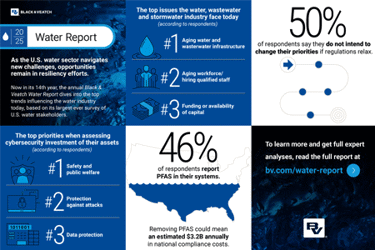New Report Details Challenges Reshaping The Water Sector

The newly released 2025 Water Report from Black & Veatch offers a stark look at the pressures facing U.S. water utilities. Based on insights from 680 industry stakeholders, the report points to growing concerns over cybersecurity, evolving regulations, and PFAS contamination.
With cyberattacks escalating, 95% of utilities now say they are investing in cybersecurity. This shift underscores a broader industry realization: water systems are critical to U.S. infrastructure and are in need of modernization.
“The report highlights the challenges our water clients are facing, from cybersecurity threats to aging infrastructure, AI adoption and the impacts of climate change,” said Donnie Ginn, executive vice president at Black & Veatch. “As they face these new challenges, utilities must rethink how they deliver water — advancing smarter sustainability practices, adapting to new regulations and modernizing systems to ensure long-term reliability and resilience.”
As PFAS contamination continues to linger top of mind for many water professionals, confidence in water system resiliency has dropped to 34% — compared to 45% in 2024. With 46% of respondents reporting that PFAS has been detected in their water supply, the threat of these forever chemicals isn’t going to subside any time soon.
Further amplifying uncertainty is the expectation of deregulation under the new administration. The report explores how utilities are responding, and found that water systems are split when it comes to making changes based on relaxing regulations. While 50% of respondents said they are unlikely to make changes, 23% said they would move money to other priorities, and 16% were unsure.
Regardless, the report shows that the water industry continues to forge ahead: 58% of respondents have made sustainability a strategic priority, and more than half are using predictive modeling to comply with new Lead and Copper Rule regulations.
Despite intensifying challenges, the 2025 report paints a picture of resiliency — and an industry determined to adapt and protect the future of water.
